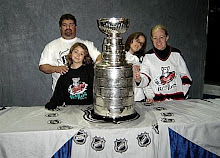Communicating with the autistic
Hello again Joanne
I hope you are well and ready for the next autism newsletter.
Today's newsletter covers some of the simple ways to communicate with someone with autism.
Communication is often more difficult for people with autism.
Autistic people tend to take things very literally.
They are not good with sayings, double meanings or jokes in speech.
When you are speaking to someone with autism you must try and avoid such figures of speech. Phrases such as "apple of your eye" will cause confusion as they will be taken literally.
It is important to speak slowly and clearly telling them what you want or what they should do. Never use sarcasm or long winded explanations as you will lose their attention and understanding.
I hope you found this tip useful.
In the next newsletter I will be talking about some of the specific dietary needs of someone with autism.
Until next time.
Rachel
http://www.essential-guide-to-autism.com/autism.html
Rachel Evans
Sandown House, High Street, Esher, Surrey, UNITED KINGDOM
I enjoy these messages that come to my Inbox related to autism. They sometimes provide me with insights, other times with reminders of what it is like to live with someone with an Autism Spectrum Disorder (as I do). This time, I wanted to take time to comment on the importance of paying attention to what we say when dealing with those with this group of disorders.
I find what Rachel says to be very true. Any time I am not literal with my daughter, she flounders, argues or simply does not respond. Often I ask if she understands what I say, and get a blank stare and "I understand". This can be disconcerting, especially when it appears that she doesn't really get what I am saying to her. Explanations repeated over and over seem to be the norm in our house.
Those with autism really do have trouble understanding spoken language, however we intend what we say to be taken. While we don't have to speak as we probably would to a foreign visitor with limited English speaking skills, it is important to spend time thinking through what we want to convey to the autistic person. My daughter is very high-functioning, with PDD. Still she needs simple explanations in short sentences. When I am stressed and go on a verbal tirade over her not completely listing her homework assignments in her planner, or getting her to stop focusing on a book (not necessarily reading it, just staring at the cover) or the TV and clean her room, I know I lose her attention after the first sentence, and need to bring her back and slow down. (This often serves the dual purpose of helping her to get the point and calming me down as well.)
I continue to read these newsletters and recommend you do as well. Checking our own actions in dealing with those around us with autism can ease the stress of the situation and help both of us to grow! It also reminds us that we are not alone in our situation. Often we get bogged down in our own situation, feeling that no one else out there knows what we are dealing with, but there are those who do and can, at least in part, explain it to us.

